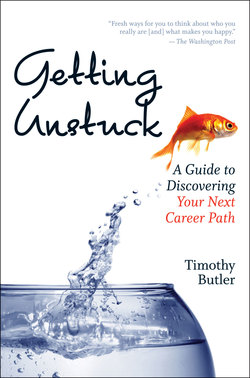Читать книгу Getting Unstuck - Timothy Butler - Страница 16
На сайте Литреса книга снята с продажи.
Impasse
ОглавлениеWhen Marcy started to see me regularly after her graduation, she was not depressed in the clinical sense of the term. Her world, however, did seem flat rather than round and full. She sensed something was missing, and this feeling was all the more pronounced because she had always experienced life rushing forward, and had always known great confidence and youthful vitality.
Marcy had accepted a job in sales, an unusual choice for Sloan graduates, who more often choose positions in professional services firms or corporations that call on the strategic skills taught in the MBA curriculum. Marcy was ambivalent about her choice. She was working for a relatively small company that provided professional employees, mostly information technology specialists, on a temporary basis. She was going on the road regionally to analyze the computer programming and computer support employment needs of potential clients. She was the only woman on the sales force, but this in itself was neither new nor daunting. In fact, Marcy enjoyed the “one of the guys” camaraderie; it reminded her of times with her undergraduate buddies at their fraternity and of hanging out with her brothers before that. No, the problem was that she just wasn’t very excited generally and could not see how this work would take her toward the management roles she had envisioned when she applied to MIT.
The most creative people I know have learned, over time, to feel more at home during these times of impasse. Not that they like the experience of feeling slowed down or stuck; like all of us they enjoy the thrill of being in motion on a new project or venture. But they no longer expend energy in avoiding the experience of impasse and, most important, they no longer fear this experience. They have cultivated a capability to experience darker and heavier times as part of a larger cycle of creativity and change. They no longer identify with impasse; they are able to say, “This condition, this feeling state is “something I am going through,” rather than “something I am.”
But most of us, like Marcy, have not learned how to turn toward the Black Sun and realize the energy that is latent in times of crisis and impasse. We leave that to the poet, painter, or songwriter. (See Deep Dive: The Feeling of Impasse.)
My sessions with Marcy, alternating between career questions and uncertainties she had about her relationship with Henry, began to turn her toward the uncertainties of her Black Sun period of change. Between talk of career and relationship, as she let herself drop down into the experience of impasse, Marcy shared something else: her father was dying of cancer. I was more interested in this than she. She would grow quiet when we turned to this topic. It was not as if she were actively avoiding talking about her father, it was just that she did not have words for it. She was not in denial; she was just stuck. Her father, a computer scientist himself, was clearly an important person for her. She had a good relationship with him, but the emotionally conservative culture of her childhood had not provided her with much of a vocabulary to reexperience it for herself or convey her experience. I sensed that Marcy’s relationship with her father was an important part of her impasse.
DEEP DIVE
The Feeling of Impasse
This first Deep Dive presents us with a paradox. Deep Dive sections are the “to do” part of the book. When you first find yourself in impasse, however, there is no “to-do.” Not yet. In fact, the impasse process does not begin until you stop “doing” the things that we all do to keep the feelings of impasse at bay. We all try to get away from the feelings of being stuck and sinking. Nevertheless, just allowing yourself to accept them is the first step. Not-doing is the first “to-do.”
But you might pay attention to those thoughts, images, memories, and feelings that crop up as you read this chapter. You have been at impasse before. You know this experience of coming to a stop, this feeling of emotional flatness, and this sense of no direction. Allow these thoughts, images, memories, and feelings to arise, develop, and then go wherever they may go. Attend to this emotional climate of impasse in a personal way now, and then continue to read on. You can return to this step in the process at any time.
